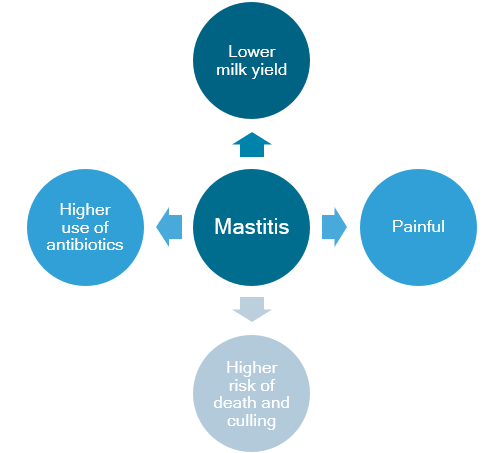Section 3 | Tackling Clinical Mastitis
Page 12 /
Types of Mastitis
Mastitis is among the most important (and frustrating) diseases in the dairy industry today. There are many reasons why we need to control mastitis (figure below).
Despite decades of research on the subject, mastitis remains a major problem in the industry. While prevention is key, when mastitis does occur, we need to do everything we can to ensure that antimicrobials are used responsibly.
Types of Clinical Mastitis
Clinical mastitis is normally categorized based on the severity of the clinical signs you observe. Properly categorizing the clinical cases of mastitis you see can help you and your veterinarian develop an appropriate monitoring and therapeutic approach for your herd.
| Category of Clinical Mastitis | |||
| Clinical signs | Mild | Moderate | Severe |
| Milk | Abnormal
|
Abnormal
|
Abnormal
|
| Udder | Normal | Inflammation
|
Inflammation
|
| Body Temperature | <39.5 °C | <39.5 °C | >39.5 °C |
| Signs of Illness | None | None | Off feed Down in milk Weak Dehydration Death |
Mild Clinical Mastitis
In mild cases of clinical mastitis, only changes in milk can be detected. The milk may have clots, there may be some change in colour (e.g. yellow), and/or there may be alterations in viscosity (e.g. the milk may get watery). There are no signs of inflammation in the udder, no fever, and the cow is eating, drinking, and milking normally.
Moderate Clinical Mastitis
Moderate clinical mastitis cases involve changes in the milk and the udder of affected cows. There will be similar changes in the milk, as seen with mild clinical mastitis. Additionally, you will see the cardinal signs of inflammation present in the udder: redness, heat, pain, and swelling. Despite this, the cow will have a normal temperature and will continue eating, drinking, and milking normally.
Severe Clinical Mastitis
Cows with severe clinical mastitis are very sick. They will have obvious changes in their milk and udder. They also have fevers, go off feed, down in milk, and can become weak and dehydrated in short order.

